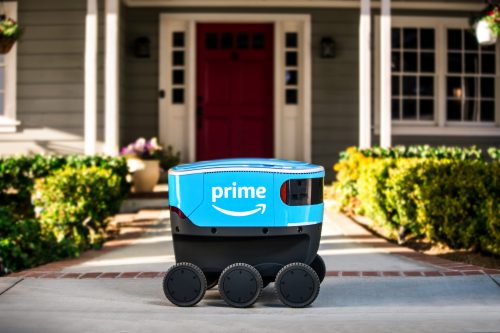The wheels are turning in the DMV’s robot delivery industry.

A robot fleet at George Mason University (Photo courtesy of Starship Technologies).
Picture this: it’s late March, life under COVID is still new and the streets are still empty. Sheltered at home, you brave a peek out the window, taking in the barrenness of your neighborhood, when all of a sudden a white box on wheels comes rolling by. It’s small, the size of a beach wagon with the build of a YETI cooler, but it’s sleek, and has headlights, and is dodging obstacles on the sidewalk, and on its tail follows another just like it. Now comes another one, and another one, and before you know it a fleet of these mini-moon rovers are maneuvering down the block.
No, your neighborhood isn’t being invaded—these are retail robots delivering groceries on behalf of Broad Branch Market. In a pilot partnership launched early in the pandemic, the Chevy Chase-based grocer teamed up with Starship Technologies, headquartered in San Francisco, to test out the tech company’s newfangled delivery bots.
Given the lack of pedestrians, the demand in delivery, and the urgent need for creative solutions, the circumstances of the pandemic offered Starship an ideal experimental environment. And the partnership proved equally advantageous for Broad Branch: sudden attention from local and national media, and an overall “very positive experience,” according to owner Tracy Stannard.
The successful pilot that wrapped in August signals the next step in the DMV’s increasingly automated delivery industry. Since 2016, robots have roamed area streets with some degree of permission, and following the passage of crucial legislation in 2017 and 2018, that permission has only been widened and extended. But recent expansion efforts, coupled with the new normalcy posed by the pandemic, suggest the once piecemeal vision is becoming a local reality.
Following its alliance in March with Broad Branch, Starship announced it would be deploying fleets into the whole of Fairfax City, Va; this decision came just over a year after the company chose George Mason University—also in Fairfax City—as its very first collegiate partner.

Amazon Scout (Photo courtesy of Amazon)
Also in early 2020, Amazon received approval from the government of Virginia to launch its own automated delivery service, Scout, a project of notable opportunity given Amazon’s new headquarters in Arlington.
As is expected, other companies nation-wide are joining the industry, such as Kroger and Walmart; yet almost no other region—with the exception of Silicon Valley—has seen more widespread legislative and community support than the DMV.
“The robots could easily gain popularity with retail vendors and restaurants,” said Tracy Stannard. “Think pharmacy deliveries or flowers, and yes—groceries.”
While Broad Branch received their bots at a particularly uncertain time, the demand posed by that uncertainty has not waned. The pandemic has changed our habits forever, such that even after it ends, the future in service will continue to be delivery, and the future in delivery will continue to be contactless. But the DMV has spent years preparing for this; the laws are in place, and the community is ready. So let the robot takeover begin.




